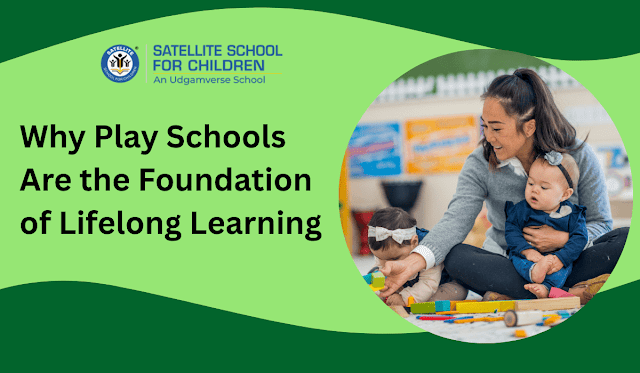Why Play Schools Are the Foundation of Lifelong Learning
The early years of a child’s life are filled with rapid cognitive, social, and emotional development. During this formative phase, a nurturing environment that blends structured learning with creative exploration can shape how a child thinks, learns, and interacts with the world. That’s where the concept of a play school becomes crucial. It is not simply a place where children pass time—it acts as a launching pad for building essential life skills that support future academic and personal success.
Children introduced to a structured
yet flexible early learning setting develop habits like curiosity,
problem-solving, empathy, and resilience. These qualities don’t just help
during their schooling years but influence how they engage with learning
throughout life. Institutions focusing on guided learning through play,
activities, and interaction are becoming increasingly important—especially in
rapidly developing educational hubs. The growing demand for the Best Online Preschool In Ahmedabad reflects how parents are actively seeking innovative
and accessible ways to ensure a solid start for their children.
The
Long-Term Benefits of Early Childhood Education
Modern neuroscience supports the
fact that 85% of brain development occurs before the age of five. During this
window, introducing a child to diverse stimuli—colors, shapes, sounds, stories,
social interactions, and routines—sets the stage for how they absorb, retain,
and apply knowledge. Structured early learning supports this growth, laying the
groundwork for a child’s capacity to think critically and adapt to changing
environments.
Here are some key lifelong skills
that begin developing in a foundational setting:
- Language and Communication: Regular interaction with peers and facilitators
strengthens vocabulary, articulation, and listening abilities.
- Social Intelligence:
Children learn to share, cooperate, resolve conflicts, and build
friendships—crucial traits for both personal and professional spheres
later.
- Cognitive Thinking:
Exposure to puzzles, storytelling, and creative activities promotes
pattern recognition, logical thinking, and early problem-solving.
- Motor Skills:
Activities like building blocks, painting, and outdoor games refine both
gross and fine motor functions.
- Emotional Awareness:
Daily routines and group dynamics help children recognize and express
emotions, as well as empathize with others.
As more families recognize these
lifelong benefits, many begin their search with terms like Play School Near
Me, highlighting how accessibility and location remain top priorities for
working parents and caregivers.
Building
a Lifelong Learning Mindset
Children exposed to meaningful early
experiences often demonstrate a stronger inclination toward exploration and
inquiry. Play-based learning ensures that education is associated with fun,
rather than pressure. This reduces the fear of failure and encourages
self-driven discovery—a habit that remains even during adulthood.
Moreover, the environment plays a
significant role. A space filled with sensory-rich experiences, diverse social
interactions, and positive reinforcement fosters confidence. It builds the
belief that learning is not just confined to textbooks but is a continuous
process rooted in everyday life.
The early exposure also affects how
children cope with transitions. Whether it’s moving to a formal classroom,
adapting to group activities, or facing minor setbacks, those who have been
nurtured in an engaging early setting show better emotional regulation and
adaptability. This resilience becomes crucial not just during academic years
but in future careers and relationships.
Cultural diversity, structured play,
and guided interactions found in quality learning setups help children
appreciate differences, learn teamwork, and become better global citizens. With
more schools incorporating storytelling, multilingual activities, and cultural
events, children develop a strong sense of identity while being open to new
perspectives.
Final
Thoughts
It’s often said that the habits formed
in early childhood last a lifetime. In today’s fast-evolving world, it is not
enough for children to just memorize facts—they need to think critically,
collaborate with others, and constantly evolve. An early learning environment
that is rich in sensory experiences and built on curiosity can nurture exactly
these qualities.
From language development to
emotional intelligence, and from curiosity to compassion—the building blocks of
lifelong learning begin much earlier than most people assume. That’s why early
learning centers aren’t just childcare options; they’re foundational
institutions shaping tomorrow’s thinkers, leaders, and creators.
If you're exploring the right start
for your little one, choosing a Playgroup In Ahmedabad that emphasizes
holistic development over academic push can make a meaningful difference. After
all, a love for learning begins not in pressure-filled classrooms, but in
joyful, play-filled environments.
.png)
.png)

.png)
Comments